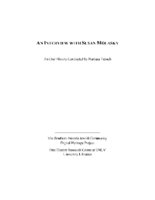Search the Special Collections and Archives Portal
Search Results

Transcript of interview with Jean Tobman, Marilyn Moran and Janie Moore by Claytee D. White, November 5, 2013
Date
Archival Collection
Description
Interview with Jean Tobman and two of her daughters, Marilyn (Tobman) Moran and Janie (Tobman) Moore by Claytee White, November 5, 2013. In this interview, Jean Tobman recalls coming to Las Vegas with her husband and two young children in the 1950s, and the life they established in the Pinto area of the Westside. Her husband, Herb, owned City Furniture and a cab company near downtown. Marilyn and Janie discuss their youth and the enjoyable time they had growing up in Las Vegas. Marilyn talks about how the city has grown and her time on the planning commission. Janie also discusses the growth of Las Vegas and her nostalgia for old Las Vegas.
In 1953, Jean and Herb Tobman moved from New Jersey to Las Vegas. The Tombans settled in the Pinto Palamino. Upon moving, Jean initially assisted her mother at her rooming house, and Herb worked with Jean's father at City Furniture. Herb bought his first cab soon thereafter, and grew one vehicle into Western Cab Company, which is still family-run. After a large fire closed City Furniture, Herb worked as the general manager at Moulin Rouge, jumpstarting his career in the gaming industry. Marilyn, Janie and Helen are the children of Jean and Herb and all still live in Las Vegas. The girls grew up keeping horses, as did many other neighbors in the Pinto area. Marilyn married John Moran, the sheriff's son, who served as a police officer himself. She sat on the planning commission for a decade, during the city's growth spurt. Janie spent a semester at Arizona State University before returning to Las Vegas to work at Stardust Hotel, a property co-owned by her father, who also served as the its president.
Text

Transcript of interview with Burton Cohen by Claytee White, January 9, 2009
Date
Archival Collection
Description
In this interview, Burton Cohen discusses his involvement in the Las Vegas casino industry, including booking entertainment for various hotels.
Burton Cohen's long casino executive career began in the mid-1960s when he accepted a proposition to become involved with the transformation of the Frontier Hotel. He left his south Florida roots and law practice to become a co-owner/general manager of the Frontier Hotel. Thus, began his highly regarded Las Vegas presence. For nearly four decades he served in the management of some of the Strip's most famous casinos: Flamingo, Dunes, Circus Circus, Caesar Palace, Thunderbird and the Desert Inn, which remains his favorite. In this interview, Burt reflects on the positions he held, the celebrities he hired and befriended, and offers a unique look at the behind the scenes marketing and entertainment strategies that he helmed. He shares stories of becoming entrenched in casino operations, his reflections of union experiences, and even anecdotes about moving his mother to Las Vegas.
Text

Transcript of interview with Leonard I. Gang and Roberta Gang by Barbara Tabach, September 14, 2016
Date
Archival Collection
Description
Leonard Gang (1935 - ) and Roberta Gang (1940 - ) are both natives of New York, though different boroughs and Jewish traditions. The couple met in 1960 while students at Cornell University and married in 1961. Two years later, Len graduated from New York University School of Law. Leonard had fallen in love with Western United States as boy on a family vacation. So when a notice was posted for a law clerk with the Supreme Court of Nevada, he knew he wanted to apply. When he presented Bobbie with a choice of Alaska or Nevada, she flatly responded that Nevada was as far west as she was willing to move. Thus, began their long and influential residencies in both Carson City and Las Vegas. In Las Vegas, Temple Beth Sholom was quickly a welcoming place to be for the Gang family. While Leonard?s law career flourished, Bobbie realized her energy and commitment to become an advocate for the benefit of the vulnerable. Over the years, she actively participated in the political campaigns of others and even entered the political arena herself, which she discusses in this oral history. During Leonard?s successful legal career, he held positions as Deputy District Attorney and Deputy Public Defender in Clark County and was in private practice. From 1971 ? 1974, he was District Court Judge in Clark County before returning fulltime to private practice. By 1988, Bobbie and Leonard had become forceful lobbyists including representing Nevada Women?s Lobby among others. In 2012, Bobbie received the Virginia Cain Progressive Award from the Washoe County Democratic Party for her leadership and dedication to the rights of others. In this oral history, the Gangs highlight their tireless efforts, the long list of political and civic leaders that they worked alongside of, some of Leonard?s high profile cases, and their Jewish heritage. They are parents of three: Lynne Moore, Karen Schnog, and Joshua Gang.
Text

Transcript of interview with Colleen Gregory by Tim Waters, April 6 & 7, 1976
Date
Archival Collection
Description
On April 6 and 7, 1976, Tim Waters interviewed Colleen Gregory (born 1928 in Santa Clara, Utah) about her life in Southern Nevada. Gregory first talks about her original move to Las Vegas, her early education, school activities, and her college education. She also talks about the first banks, Helldorado, the atomic testing, and environmental changes. Other topics covered include Howard Hughes, Western-style influences, first properties on the Strip, World War II, racial prejudice, and changes she has noticed during her career in banking.
Text

Transcript of interview with Theda Kay Grinnell by Fletcher Corey, February 28, 1977
Date
Archival Collection
Description
On February 28, 1977, Fletcher Corey interviewed Theda Kay Grinnell (born 1935 in New London, Iowa) about her life in Las Vegas, Nevada. Grinnell first talks about her move to Nevada and both her and her husband’s work at the Nevada Test Site. She also talks about the atomic blasts, competition with Russia, and her employment that followed her work at the Test Site. Grinnell later talks about her church membership and goes into detail about the race riots and how they involved and impacted her and her son. The end of the interview includes discussion on flash floods, the culinary union, how World War II affected the Las Vegas industry, and the social changes in Las Vegas.
Text

Transcript of interview with Myrtle Hancock by Russell Oakes. February 26, 1980
Date
Archival Collection
Description
On February 26, 1980, collector Russell Oakes interviewed beautician, Myrtle Hancock (born January 1st, 1921 in Craig, Colorado) in her residence in Las Vegas, Nevada. This interview covers the narrator’s occupational experience as a wardrobe dresser in the entertainment industry in Las Vegas. She also discusses family life, life on a ranch, Downtown Las Vegas, Helldorado, and Nevada’s hot weather. The interview concludes with a discussion on the development of Las Vegas and the projected future growth.
Text

Transcript of interview with Vivian Harwell by Pamela Atkins, February 27, 1979
Date
Description
On February 27th, 1979, Pamela Atkins interviewed Vivian Harwell in Las Vegas, Nevada. Harwell begins the interview by explaining her reasons for moving to Las Vegas from Arkansas, and the type of living quarters that she had. She then goes on to talk about the recreation in Las Vegas in addition to the Nevada Test Site and local politics. The two later discuss the convenience of having local colleges available in Las Vegas and the availability of children’s activities in Las Vegas. The interview concludes with Harwell’s personal reflection on her time living in Las Vegas, and that she does not regret moving to Las Vegas.
Text

Transcript of interview with Kerin Scianna Rodgers by Dennis McBride, February 24, 1998
Date
Archival Collection
Description
Kerin Rodgers owned a retail fashion store and modeling agency with a friend in Santa Monica, California. She came to Las Vegas in 1966 to work at The Broadway department store. She bought a home in the John S. Park Neighborhood in 1974. Popular radio personality; active in local and national politics.
Text

Transcript of interview with Jim Marsh by Claytee D. White, June 5, 2012
Date
Archival Collection
Description
Jim Marsh in Denver, Colorado. Father was the chief for the Colorado Patrol. Mother lived in Nebraska. Jim split time in both places while growing up. He was a service member of the Army and once getting out of the service he started his work with his father at a Ford dealership. Jim went on to work and own dealership in several different areas, Colorado, California, New Mexico, and Washington states before arriving in Las Vegas, NV in 1971. Once arriving in Las Vegas Marsh purchased a dealership called American Auto Mart. Around 1976 Jim Marsh bought the Santa Fe Saloon along with the twenty lots surrounding it for 12,500. This was his first experience in the gaming industry Marsh was the only dealership in the world for 25 years to have a gaming license in a new-car dealership. Marsh discovered interest in Belmont when there was a lone resident Rose Walter. The two bartered and Jim gained land in Belmont and went on to build a bar and church for the town. Marsh eventually went on to own the Skyline Casino. Jim Marsh founded the Nevada Auto Auction in 1987 on Las Vegas Boulevard South Eventually sold it and used the investment to build the Longstreet Casino. Marsh was' also a member of business organizations, Better Business Bureau and The Red Cross Marsh has been a member of the Salvation Army Advisory Board for at least 25 years. Tonopah is another location that Marsh has invested in. After leasing the gaming at the Mizpah Hotel to later buying the Valley Bank building and moving the gaming from Mizpah. It is still successful today. He also purchased the Tonopah Station House which is a hotel bar, and restaurant; along with owning the grocery store Scolari's next-door. Tonopah has proved to be a very good investment for Jim Marsh.
Text

